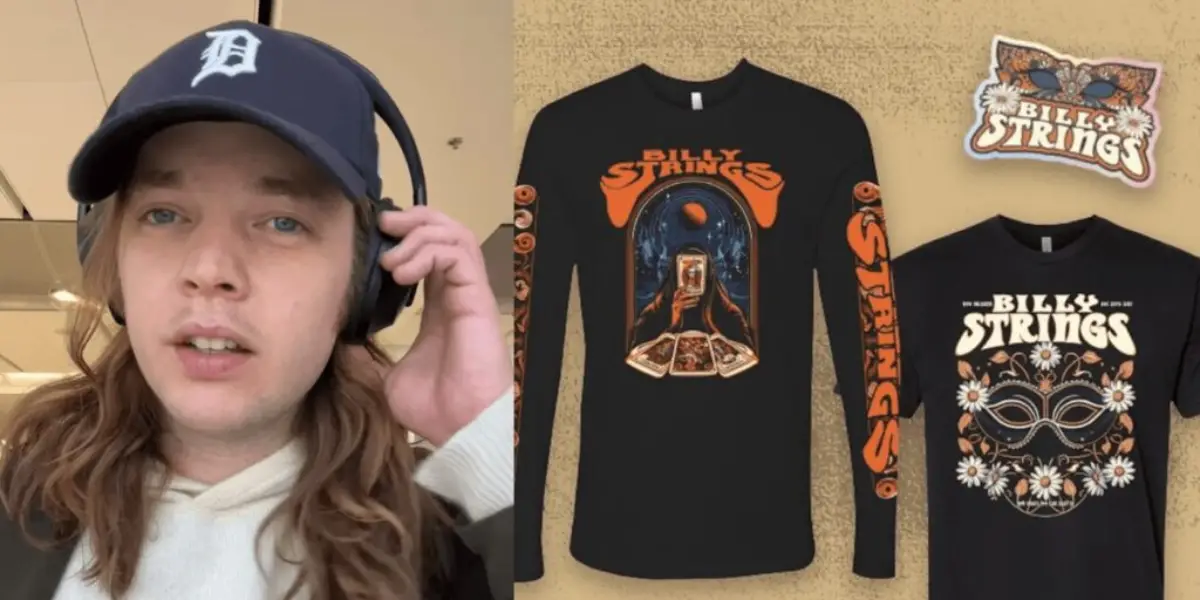Billy Strings Addresses AI Art Uproar Over His NYE Merchandise

In an era where technology increasingly intersects with every facet of our lives, the recent controversy involving Billy Strings and his use of AI-generated art for merchandise has sparked a profound conversation in the music industry. This incident, centered around the acclaimed musician’s New Year’s Eve merchandise, has opened up a Pandora’s box of debates and discussions. It touches on the ethical implications of AI in art creation, the impact on traditional artistry, and the evolving relationship between artists and their audience in the digital age. As AI tools become more prevalent in creative industries, they bring with them a host of challenges and opportunities. This case not only highlights the complexities of integrating AI into the music and art world but also prompts a reevaluation of what authenticity means in the age of digital creation.
The controversy around Billy Strings’ use of AI-generated art for his merchandise has ignited a significant debate in the music industry. It highlights the complex interplay between technology and creativity, raising crucial questions about authenticity, artistic integrity, and the future of AI in music.
Table of Contents
Who is Billy Strings?
Billy Strings stands out as a dynamic figure in the music world, renowned for his electrifying performances and innovative approach to bluegrass music. His style, while deeply rooted in traditional bluegrass, seamlessly incorporates elements from a variety of genres, showcasing his versatility and creative spirit.
Strings’ journey in music is marked by his deep connection to bluegrass traditions, infused with a modern twist. His website highlights his ability to keep the improvisational spirit of bluegrass alive while embracing diverse musical influences. This unique blend has earned him a dedicated fan base and critical acclaim, positioning him as a leading figure in contemporary bluegrass music. His concerts are known for their high energy and the seamless fusion of classic and modern sounds, making each performance a unique experience for the audience.
Billy Strings’ discography is a testament to his artistic range and collaborative spirit. His recent projects include a live performance recorded on March 4, 2023, which captures the essence of his electric concerts. He has also collaborated with legendary artists like Willie Nelson, showcasing his ability to bridge generational gaps in music. His album “Me/And/Dad,” featuring his father Terry Barber, is a heartfelt tribute to bluegrass and country classics, reflecting his deep musical roots and family ties. These projects not only highlight his skill as a musician but also his respect for the genre’s history and his desire to push its boundaries.

Billy Sterlings Sparks Controversy by Wearing Suspected AI Shirt
Emergence of the Controversy
The issue came to light when eagle-eyed fans noticed a distinct style in the artwork on Billy Strings’ merchandise that seemed uncharacteristic of human-created art. The designs, sold during his New Year’s Eve performances in New Orleans, were initially celebrated for their creativity and uniqueness. However, the mood quickly shifted as discussions on social media and various online forums suggested that the designs bore striking resemblances to those generated by AI art platforms. Fans and artists alike began to question the authenticity of the artwork, leading to a broader conversation about the ethics and implications of using AI in artistic creations, especially in merchandise connected to a music artist known for authenticity and grassroots appeal.
The Backlash and Fan Reactions
The backlash was swift and vocal. Fans expressed their disappointment and confusion over the use of AI-generated art, feeling that it contradicted the organic and authentic image that Billy Strings had cultivated. On platforms like Reddit and Phantasy Tour, users debated the issue, with some defending the use of modern technology in art, while others argued it undermined the value of human creativity and the hard work of genuine artists. The controversy highlighted a growing concern in the art and music communities about the increasing prevalence of AI and its potential to disrupt traditional notions of creativity and originality. This debate set the stage for Billy Strings to address the controversy directly, leading to his candid response on social media.
Also read:The Controversy of Sound: Bad Bunny’s Stand Against AI-Generated Music,The Sports Illustrated Controversy: AI Writers in Sports Journalism
Billy Strings Responds to AI Art Controversy Stemming From NYE Shirt Sales
Strings’ Initial Reaction and Explanation
Billy Strings, known for his authenticity and close connection with his fan base, began by expressing his surprise and concern over the allegations. In a video posted on his official Instagram account, Strings explained, “I’m popping on here to talk a little about New Year’s Eve and these t-shirt designs that everyone has claimed were made by AI.” He continued, detailing his involvement in the merchandise design process, “I’m pretty hands-on with the art, you know? I try to approve everything, but with everything going on and all the shows and stuff, there are times where I maybe have been a little complacent.”
Strings acknowledged that he had seen the designs and approved them, believing they were cool enough for the event. He mentioned, “They seemed like cool enough designs to me. Looks like something some other artist would have made.” This statement reflects his initial belief that the designs were indeed created by human artists.
Addressing the AI Allegations
As the controversy escalated, Strings delved deeper into the specifics of the situation. He expressed his initial belief that the designs were fan-made, a practice he has always supported. However, upon learning about the AI allegations, he reached out to his manager for clarification. Strings shared, “We go out on a limb, and we try to use this fan’s art. So, the day of the show–the first of three in New Orleans, down there, I got online and I saw all this internet and I see this fuss, this big kerfuffle online, talking about how these shirts are AI, and callin’ me out, callin’ the artist out.”
Strings remained unsure about the human component of the shirt but shared that he reached out to his manager who confirmed the person who submitted the design has yet to prove it is original with line drawings. Using an analogy, Strings added, “But you know I’ve always said if 500 people are callin’ it a bluebird, the fuckin’ bird’s probably blue.”

The Public's Reaction to the AI Art Controversy
The AI art controversy involving Billy Strings’ merchandise sparked a wide range of reactions from the public. Fans and observers took to various platforms to express their opinions, leading to a multifaceted discussion about the use of AI in art, especially in the context of merchandise linked to a music artist.
Concerns Over Authenticity
- Skepticism About AI’s Role: Many fans expressed skepticism about the use of AI to create art for merchandise, questioning the authenticity and originality of such works.
- Disappointment in the Artist: Some fans felt disappointed, believing that the use of AI art contradicted Billy Strings’ image as an authentic and grassroots artist.
Debate Over Artistic Integrity
- Ethical Implications: The debate extended to ethical considerations, with discussions about whether AI-generated art diminishes the value of human creativity.
- Impact on Artists: Concerns were raised about the impact of AI on artists who rely on their craft for livelihood, with AI being seen as a potential threat to their work.
Diverse Opinions on Technology in Art
- Embracing Innovation: A segment of the audience showed support for the integration of technology in art, viewing it as an inevitable progression in the digital age.
- Calls for Transparency: Regardless of their stance on AI art, many agreed on the need for transparency about the use of such technology in creating merchandise.
Future Implications for the Music Industry
- Potential Trends: The controversy sparked discussions about potential future trends in the music industry regarding the use of AI in various aspects, including merchandising.
- Artist-Fan Dynamics: The incident highlighted the importance of understanding and respecting the expectations and values of fans in the digital era.
The Debate Over AI in Art and Merchandising
The controversy surrounding Billy Strings’ use of AI-generated art for his merchandise has ignited a heated debate over the role of AI in art and merchandising. This debate encompasses various perspectives, ranging from ethical considerations to the impact on the art community and the future of artistic expression.
Ethical Concerns of AI in Art Creation
- Originality and Creativity: Critics argue that AI-generated art lacks the originality and emotional depth that human artists bring to their work.
- Intellectual Property Issues: There are concerns about intellectual property rights, as AI often draws inspiration from existing artworks, potentially leading to copyright infringement.
Impact on Artists and the Art Community
- Threat to Traditional Artistry: Many in the art community view AI as a threat to traditional art forms and the livelihood of artists.
- Devaluation of Art: There is a fear that the widespread use of AI in art could lead to a devaluation of handcrafted art, affecting the market and artists’ income.
The Role of AI in Modern Merchandising
- Efficiency and Innovation: Proponents highlight AI’s ability to efficiently produce diverse and innovative designs, catering to a wide range of tastes.
- Cost-Effectiveness: AI can significantly reduce the costs associated with art creation, making it an attractive option for businesses.
Consumer Perception and Acceptance
- Mixed Reactions from Consumers: While some consumers appreciate the novelty of AI art, others prefer the authenticity of human-created designs.
- Demand for Transparency: There is a growing demand for transparency in the use of AI in art creation, especially when it comes to merchandise linked to artists known for authenticity.
Future Implications for the Art Market
- Potential for New Art Forms: AI could lead to the emergence of new art forms and collaborations between human artists and AI.
- Regulatory and Ethical Guidelines: The debate underscores the need for clear regulatory and ethical guidelines to govern the use of AI in art and merchandising.

The Future of AI in the Music Industry
AI in Music Creation and Production
The use of AI in music creation and production is poised to become more prevalent. AI algorithms can analyze vast amounts of music to generate new compositions, offering tools for artists to explore new creative possibilities. However, this also raises questions about the uniqueness of AI-generated music and its impact on the traditional skills of composition and performance. While AI can assist in the creative process, there is a growing debate about where to draw the line between human creativity and machine-generated content.
Personalization of Music Experiences
AI’s ability to analyze listener preferences and behaviors could lead to highly personalized music experiences. Streaming services might use AI to curate playlists that cater to individual tastes or even create custom tracks tailored to a listener’s mood or context. This personalization, while enhancing user experience, could also narrow the exposure to diverse music styles and artists, potentially impacting the discovery of new music.
AI in Marketing and Merchandising
AI’s role in marketing and merchandising in the music industry is expanding. From generating unique merchandise designs to predicting market trends and consumer preferences, AI can offer valuable insights for artists and producers. However, as seen in the Billy Strings controversy, there’s a delicate balance to be maintained in ensuring that AI-generated merchandise aligns with an artist’s image and the expectations of their fan base.
Ethical and Legal Considerations
As AI becomes more integrated into the music industry, ethical and legal considerations come to the forefront. Issues around copyright, ownership of AI-generated music, and the ethical use of AI in creating and marketing music are becoming increasingly important. The industry will need to develop new frameworks and guidelines to address these challenges, ensuring fair practices and respect for both artists and consumers.
The Future of Live Performances
AI could also transform live music performances, offering new forms of interaction and immersive experiences. From AI-driven visual effects to virtual reality concerts, the possibilities are vast. However, this also raises questions about the essence of live performances and the irreplaceable value of human presence and spontaneity in music.
Conclusion
The Billy Strings AI art controversy serves as a microcosm of the broader challenges and opportunities presented by the integration of AI in the music industry. From sparking debates over authenticity and artistic integrity to raising questions about the future role of AI in music creation, merchandising, and live performances, this incident has opened up a Pandora’s box of ethical, legal, and creative considerations. As the industry grapples with these issues, it becomes clear that the path forward requires a delicate balance between embracing technological innovation and preserving the human essence that lies at the heart of music and art. The future of AI in the music industry is not just about technological advancement; it’s about redefining the relationship between artists, their art, and their audience in an increasingly digital world.

